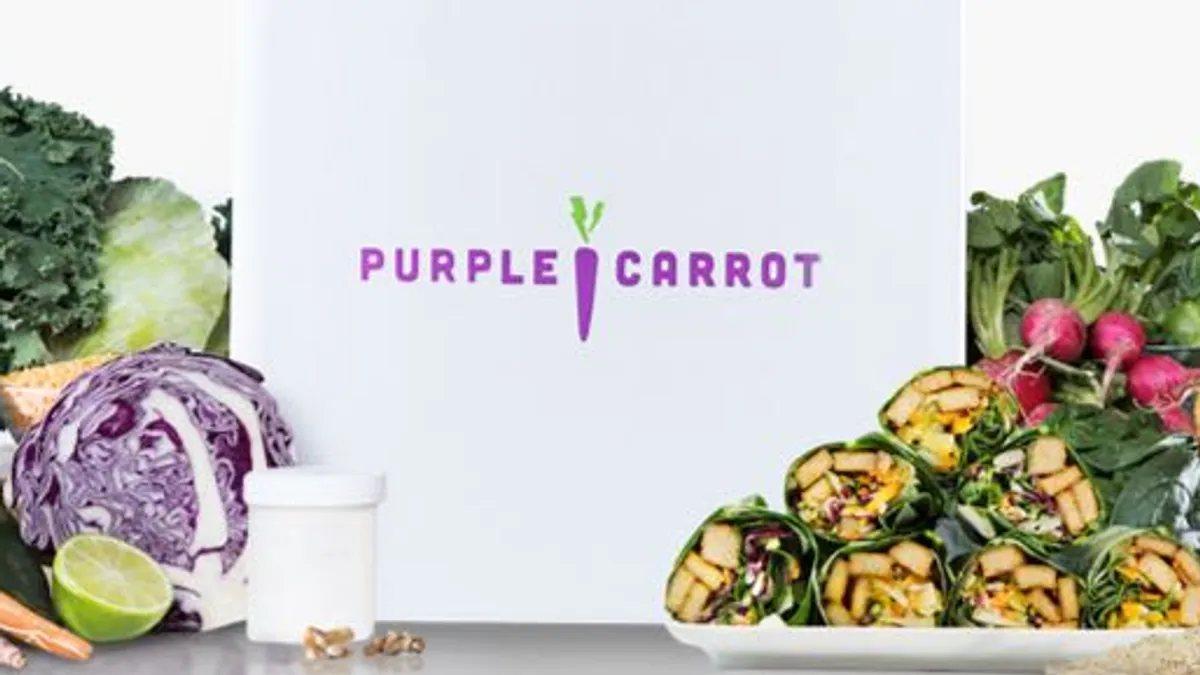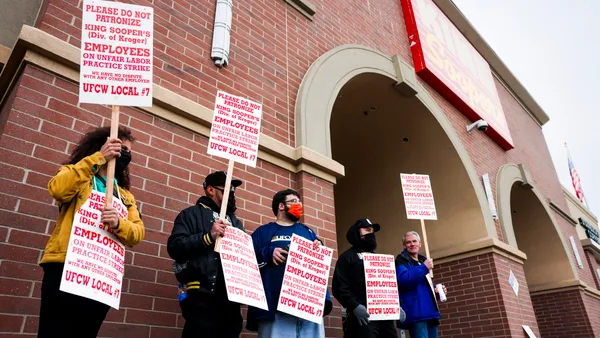UPDATE: May 22: Purple Carrot has updated the terms of its acquisition and provided comment. The deal includes an upfront payment of $12.8 million, according to the company, and a potential for an additional $17 million by 2021 if unspecified earnings goals are met. Purple Carrot will retain its leadership, including CEO Andy Levitt, and will continue to operate out of its headquarters in Boston. "By partnering with this Japanese powerhouse, we’ll bring Purple Carrot plant-based meals to even more consumers and significantly increase the positive impact of our business well into the future," Levitt said in a statement.
Dive Brief:
- Purple Carrot, the plant-based meal kit company that has partnered with celebrities like Tom Brady, was acquired last month by Japanese e-grocer Oisix ra daichi for $12.8 million, with an additional $17 million coming if the company hits unspecified financial goals, or earn-outs, by 2021, according to a news release. The deal was approved by Oisix's board of directors on April 25 and is expected to close on May 31.
- According to the notice, which surfaced in a LinkedIn post by former Purple Carrot and Chef'd senior staffer Sean Butler, Purple Carrot has 22,000 subscribers and in 2018 posted a loss of $4.3 million alongside net sales totaling $43 million. Eighty percent of the company's shares are owned by CEO Andy Levitt and president Brian Greenfield.
- Oisix stated it began talking with Purple Carrot executives in the second half of 2018, and said the acquisition reflects the compatibility of the two business models and an opportunity to build its meal kit business in Japan.
Dive Insight:
Purple Carrot has hitched itself to the popular plant-based eating trend and forged a few star-power deals to gain visibility — most notably New England Patriots quarterback Tom Brady, who lent his name to the company’s $78-a-week "TB12" diet, which is modeled after his own culinary regimen.
But not even one of football's all-time greats has boosted the struggling business's bottom line. Although Purple Carrot grew net sales from less than $9 million in 2016 to more than $40 million in 2018, according to the disclosure posted by Oisix ra daichi, earnings never materially improved. CEO Andy Levitt told FoodNavigator-USA in October that the company expected to be profitable this year, but it’s hard to see how that could be achieved barring a significant change to the business model.
Investors ranging from Mario Batali to Del Monte have pumped money into Purple Carrot, helping make it one of the fastest growing meal kit companies in the business. But effectively gaining and retaining customers for pricey subscriptions has proven difficult for industry players, and on this key metric Purple Carrot appears to have struggled. According to data from analytics firm Second Measure, the company’s 12-month customer retention between September 2015 and October 2017 lagged competitors.
Emory marketing professor Dan McCarthy, who has closely tracked the industry, posted the Second Measure data in a Tweet responding to the news of Purple Carrot’s sale. He noted meal kit companies are starting to focus less on a "grow grow grow" philosophy and more on "durable sales."
Purple Carrot's story has become all too familiar to a meal kit industry beset by high costs and low customer loyalty. Blue Apron has taken a nosedive since it went public in 2017 and is in danger of being de-listed, while numerous other startups in the space have come and gone. Meal kits have started popping up in retail stores, where customers can pick up offerings without having to commit to a subscription plan, but there are signs that side of the business is struggling, too. Albertsons has scaled back its Plated rollout and laid off 10% of the meal kit company's corporate staff, while a trial of Blue Apron meal kits in Costco stores ended abruptly late last year. Purple Carrot ran an in-store pilot with Whole Foods that lasted just a few months.
Butler, the former Purple Carrot staffer who now works as managing director at LIDD, a supply chain consulting and engineering firm that works closely with CPGs and meal kit companies, is critical of Purple Carrot’s leadership, which he says encouraged employees to purchase company stock options. Investors’ stake in the sale totaled less than $1 million. But he remains upbeat on the future of meal kits, which still enjoy growing demand and are seeing the best companies position themselves for more sustainable growth.
"Meal kit companies in the United States are not dying," Butler told Grocery Dive in a phone interview. "They are adapting to serve a more tailored audience, and it's not the same audience they served three years ago when they had hundreds of millions of venture capital to acquire customers artificially."













